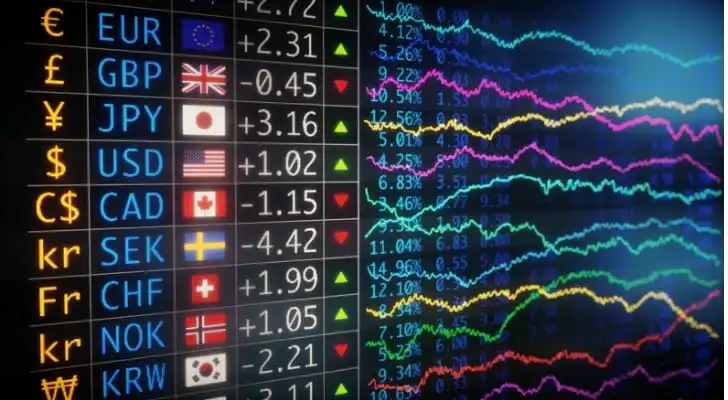Forex (foreign exchanges) and options contracts are two of the most complicated asset classes on the market. While the explosion of low-cost trading platforms has democratized access to these products, they have not become any easier to understand – or any less risky for the retail trader. However, that does not mean you should avoid them. Options, in particular, can offer strong diversification to a portfolio when used strategically, but it does mean that retail investors should approach with caution. When comparing forex vs. options trading, this is what you need to know about how these two asset classes stack up.
Consider working with a financial advisor as you explore higher risk investments.
Forex vs. Options: What Are They?
In some ways it’s difficult to compare forex and options trading, because these are very different types of assets.
Forex
A foreign exchange, or forex, allows you to swap foreign currencies against each other. Unlike some asset classes, this is not a representative transaction; for example, you are not swapping the value of a euro against the value of a British pound. With forex, you exchange an amount of currency and receive an amount of foreign currency in exchange based on the exchange rate. You then hold that currency in your brokerage account until you are ready to make another trade.
Each currency in the world fluctuates in value based on the needs of its underlying economy. For example, if companies in America want to do more business or make more investments in the Eurozone, those businesses would need to trade their dollars for euros in order to make those transactions. This increases the value of the euro relative to the dollar as demand shifts between those two currencies. (Readers should note that this is not the same thing as inflation, although the two concepts are related.)
A forex trader tries to make money from these currency fluctuations. The investor tries to make trades for currencies that have increased in value relative to one another. In some cases, this means elaborate exchanges involving many different currencies to maximize market value. In other cases, an investor will simply trade the same two currencies back and forth based on market fluctuations.
That, in a nutshell, is forex trading.
Forex Trading: Example
For example, say the value of the U.S. dollar/euro was trading at 1/1.10. This means if you exchange $1.00 U.S., you will receive 1.10 euros. As an investor, you might make a trade, exchanging $1,000 U.S. for 1,100 euros.
Then, the value fluctuates. The U.S. dollar/euro goes to 1/1.08. If you swap $1.00 U.S., you will receive 1.08 euro., or, if you exchange 0.925 euros, you will receive $1 U.S.
We swap our euros back for dollars and receive $1,018 U.S.
Options
An options contract is what’s known as a derivative because its value derives from the value of another asset on the marketplace. With options, you trade on the value of various assets, ranging from stocks and securities to commodities, cryptocurrency and virtually any other marketable asset.
However, unlike with forex, options contracts rarely (if ever) actually trade the underlying assets themselves. Instead, a standard option simply takes its value from the underlying asset.
The most essential element of an options contract is that investors have the right, but not the obligation, to make this transaction. If your contract is unprofitable, you can simply walk away from it.
As its name suggests, an option contract is a contract to buy or sell some asset for an agreed-upon price at an agreed-upon date. However, when comparing call contracts vs. pull contracts, there are a few key differences.
- Call contracts are options where the buyer gets the right to buy the underlying asset.
- Put contracts give the buyer the right to sell that underlying asset.
Options Contracts: Example
You buy the following contract: Call contract, XYZ Co. stock, $20, January 1.
This contract would give you the right to buy XYZ Co. stock from the seller on January 1 for $20 per share.
An options trader tries to make money from future market fluctuations. Someone who buys a call contract makes money if the price of their asset exceeds their agreed-upon price because this means they can buy that asset for less than it is worth.
Meanwhile, someone who buys a put contract makes money if prices drop since they can sell that asset for more than it is worth. These contracts are entirely based on an investor’s predictions of future market volatility.
Most options contracts are settled on a cash basis. This means that you do not actually exchange actual assets on which the contract is based, just the cash value of the transaction.
Forex vs. Options In Your Portfolio

When comparing forex vs. options, you will find that both are highly speculative asset classes. In fact, forex may be one of the most speculative asset classes on the market, with options not far behind.
When trading either asset, you should do so with the segment of your portfolio that is set aside for speculative, higher-risk trading. A good rule of thumb would be to approach options as moderately more speculative than trading individual stocks, while forex should be approached with extreme caution – if at all.
For the retail investor, perhaps the two most important distinctions between options and forex trading are speed and complexity.
Speed
The forex market is one of the fastest-moving markets in modern finance. Forex investors rarely hold positions open past a few days. It is so rare to hold positions overnight that most brokerages charge an additional holding fee for doing so.
The options market generally moves more quickly than most other major asset classes. Investors in this market will typically move in a matter of months, sometimes less. It is not uncommon for options traders to open and close a position within weeks or days. While this is not the twitch-trading of the forex market, it is much faster than the years that many investors will spend holding individual equities and funds.
Complexity
The forex markets are some of the most technically complex in the world, and even most economists don’t always understand what makes one currency jump against another. This is a highly technical trading environment based almost entirely on data, and traders generally open and close their positions on pennies or fractions of a cent. This is also an extremely high-volume market where you must trade large sums to make meaningful profits.
The options market is very complex, and many investors get themselves in trouble thinking otherwise. In fact, the greatest danger is that investors may believe the “optional” nature of this asset makes it zero-risk. It is anything but.
However, options do trade against underlying assets, which means that you can engage in robust fundamental trading, as well as technical trading. This makes options a far more approachable asset class than forex, particularly for retail investors looking to add some diversity and speculation to their portfolio.
Tax Implications
One critical difference between forex and options trading is how the IRS treats your gains and losses. Understanding the tax implications of each asset class can help you better estimate your after-tax returns so you can avoid unpleasant surprises at filing time.
In the U.S., most forex trades fall under IRC Section 988, which treats gains and losses as ordinary income rather than capital gains. This can be beneficial if you have losses, as they can offset other types of income.
However, traders may be able to elect Section 1256 tax treatment instead, which treats forex profits under a 60/40 rule, meaning 60% long-term capital gains and 40% short-term. This is typically more favorable, but the election must be made in advance and cannot be changed later in the year.
Options contracts generally fall under Section 1256 if they are considered broad-based index options or other regulated futures. These contracts also qualify for the 60/40 tax split.
In contrast, equity options, such as options on individual stocks, are taxed as short-term or long-term capital gains, depending on how long you held the position. For example, buying a put on a stock and holding it for less than a year would be taxed as a short-term capital gain if it is profitable.
Regardless of the asset, active traders must keep detailed records of dates, contract details and entry and exit prices to calculate gains and losses accurately. Many brokerages provide end-of-year tax documents, but if you are making high-frequency trades, especially in forex, it is wise to use dedicated tax software or consult a tax professional.
Risk Management Tools
Given their speculative nature, both forex and options trading require disciplined risk management strategies to avoid outsized losses. Without guardrails, even a small mistake can lead to significant portfolio damage, especially when leverage is involved.
In forex trading, one of the most important tools is the stop-loss order. This automatically closes your position if the market moves against you by a specified amount, helping cap your losses. Because forex trades often involve leverage, position sizing is equally critical. You should only risk a small percentage of your account on each trade, typically 1% to 3%, to avoid losing everything to a few bad moves.
Options traders have additional tools at their disposal. One is the use of protective puts, which act like an insurance policy by limiting losses on a stock you own. Another is the ability to construct multi-leg strategies like spreads and straddles that can reduce risk while still offering upside.
Both markets rely heavily on volatility indicators. In forex, traders may watch geopolitical events or macroeconomic indicators. In options, implied volatility, plays a central role in pricing. It shows the market’s forecast of future price movement so investors can make a more informed decision.
In either case, trading without a clear plan for risk management is more like gambling than investing. Whether you favor forex or options, learning to protect your capital is as important as generating returns.
Bottom Line

Forex is the market for trading foreign currencies against each other. It is fast-paced, highly technical and extremely risky for retail investors. Meanwhile, options contracts serve as derivatives that are based on the value of underlying assets. Utilizing both technical and speculative analysis can set you up for better success in the options market, so long as you’re careful with your money.
Consider working with a financial advisor on a strategy for your portfolio.
Tips on Investing
- A financial advisor can offer valuable insight and guidance as you explore high-risk investing. If you don’t have a financial advisor yet, finding one doesn’t have to be hard. SmartAsset’s free tool matches you with up to three vetted financial advisors who serve your area, and you can interview your advisor matches at no cost to decide which one is right for you. If you’re ready to find an advisor who can help you achieve your financial goals, get started now.
- Forex might be technical and risky, but it is also interesting. This is literally the market that makes the world work. Even if you’ve never made a single currency swap, the forex market still lets you buy Etsy products from Canada, cars from Sweden and take vacations in Brazil. Here’s how.
Photo credit: ©iStock.com/matejmo, ©iStock.com/Diego Thomazini, ©iStock.com/insta_photos
